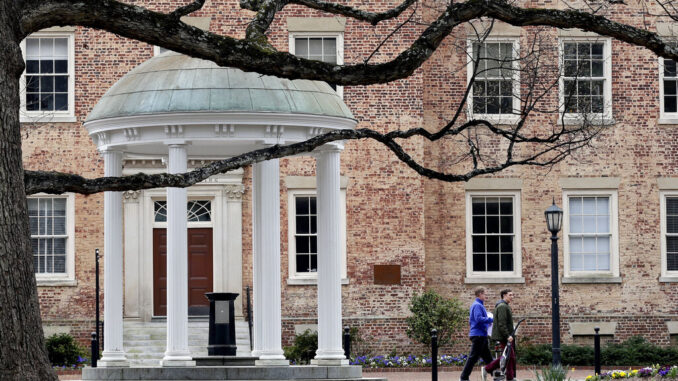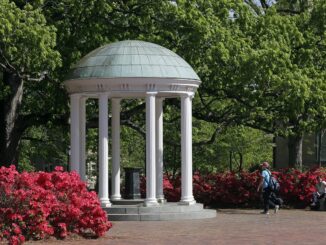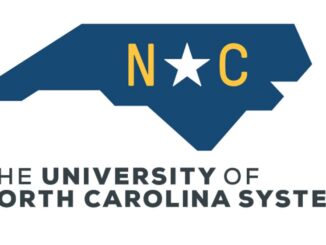
RALEIGH — University of North Carolina Board of Trustees Chair John Preyer is pleased with Jed Atkins as the pick for the inaugural dean of the School of Civic Life and Leadership (SCiLL) at the University of North Carolina at Chapel Hill.
“I mean, we have been incredibly fortunate,” said Preyer in an interview with North State Journal. “(Atkins is) arguably the most sought-after person in the universe of schools that are pursuing their own schools of civic life and leadership. I’m very pleased.”
Preyer shared a comment made by Atkins, in which he said, “It’s hard to imagine anything less contentious than the idea that we should be providing students with a liberal arts education that prepares them for the weighty responsibilities of democratic citizenship.”
“I agree with that thought 100%,” Preyer said. “So I would hope that everyone that loves the university, everyone that wants the university to lead and be a national leader on something really important — they should all fully embrace the School of Civic Life and Leadership.”
Per its website, SCiLL “provides an interdisciplinary home specifically for the study and practice of public discourse, civic life, and civic leadership” and “provides students a grounding in the foundations and current state of American political experience and democracy.”
Atkins, currently serving as an associate professor of classical studies at Duke and director of the school’s Civil Discourse Project, was appointed earlier this month as the inaugural director and dean of SCiLL. His start date is March 28, and Atkins will hold the Taylor Grandy Distinguished Professorship on the philosophy of living.
Atkins, part of the Duke faculty since 2009, specializes in Greek and Roman political and moral philosophy as well as the history of political thought, and he has led on topics such as tolerance and civil discourse. Before his tenure at Duke, Atkins obtained a master’s degree in philosophy in political thought and intellectual history as well as a doctorate in classics from the University of Cambridge.
“So in the short run, what we would like to see is this school create an atmosphere on our campus that results in much more critical thinking, the constructing of arguments and defense of points of view in a way that is currently not taking place in many parts of the country,” Preyer said of the hopes and goals of SCiLL. “And in order to better refine the sort of meaning of what it is to be civil and respectful in your argument, we’ve created a bastion of that at the University of North Carolina now that will hopefully be a model for other places around the country.
“And if we’re the leader, others will follow, and I hope that this will spark reform and higher education across the country so that we do not have the continuation of cancel culture in the way that we’ve seen the past several years.”
Preyer, a graduate of UNC in political science, has served on various boards at the university, including the Board of Visitors for the UNC Institute for the Environment and the University’s Board of Trustees.
Appointed as chair of the trustees in August 2023, Preyer has a background in environmental issues, including serving as legislative director for U.S. Sen. Lauch Faircloth, which led him to co-found Restoration Systems, a company focused on wetland and habitat mitigation.
Students who minor in civic life and leadership will explore “interdisciplinary training” in civics, the humanities and scientific literacy to enable students to be “lifelong citizens-scholars committed to confronting the challenges that face our democracy.” The minor program is scheduled to launch in the fall.
“Everything thus far has been overwhelmingly positive,” Preyer said of student reaction to SCiLL. “And the one thing that we’ve continued to hear from students is, ‘When will classes be available?’ and we will be starting them this upcoming fall,” said Preyer. “And we hope that we will have record turnout for a new program like this.”
SCiLL faced some challenges in the past year, with critics claiming the creation of the school was unnecessary and an overstepping of the BOT’s authority.
In early 2023, UNC Faculty Chair Mimi Chapman called SCiLL “a solution in search of a problem” despite plans for such a school being in the works as part of the public discourse program at UNC since 2016.
“Provost Chris Clemens was sort of the architect of that effort,” Preyer said of the SCiLL controversy. “And the faculty as well as the university was, at the time, trying to stand up a new program in public discourse.”
He described the public discourse program as having become a speaker series instead of an active program as the reason the board decided to move forward with SCiLL.
Preyer said he’s seen “almost no criticism since the board passed the resolution a little over a year ago.”



